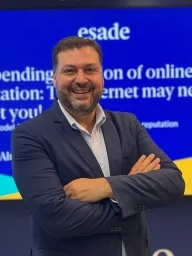Pedro Duque, Hispasat CEO: “What happens in space disrupts the other industries in the economy”
“Investors wanting to safeguard their investments should keep an eye on what’s happening in space.” This is one of the comments reiterated by Pedro Duque, current Hispasat CEO, whilst talking to Mario Lara, director of Esade Madrid, at the latest Esade Desayunos organized by Esade Alumni in Madrid.
As Duque explained, research in the aerospace industry brings about countless changes in different industries. It becomes a disruptive powerhouse for the economy and gives rise to unimaginable changes. “For example,” said Duque, “delivery times for online purchases are now shorter because satellites help prevent delivery vans from taking the wrong route. As for companies intending to channel mobile communications via their satellites, well, investors in the companies that install cell towers will have to follow these developments very closely.”
Space management tailored to business management
During the conversation, Duque explained how certain conflicts and circumstances in the aerospace industry are dealt with and how the lessons learnt are applicable to both business and the rest of the economy. He knows what he is talking about because besides being Spain’s first astronaut to travel into space, he has also been the country’s Minister of Science, Innovation and Universities, and the director general of GMV – another foremost aerospace company.
“When designing contingency plans for a spacecraft, each part is analyzed along with its possible failures and impact on the other parts in the spacecraft. Every scenario must be planned in advance. This should be the case in all industries and spheres: we must maximize the programming of activities and let people’s intelligence intervene when absolutely essential.”
Duque then emphasized the importance of teamwork. “Thousands of people help draft operating manuals. We must be able to trust the team and ensure everything runs smoothly so that everyone is responsible for their work. For example, awards are given to people who make contributions that are very small but help improve the quality of an operation. “As for in-house team management,” he said, “when mistakes happen, it’s important not to finger-point and blame whoever had the failure without scanning the system first to pinpoint the source of the failure. The fault could lie in the protocol or one of the rules or the way they’re implemented. This must be completely clarified to stop it happening again.”
He also mentioned ego management. “When recruiting astronauts, we don’t retain candidates who want to stand out more than work in a team. Besides, this is something that can easily happen because these guys become famous the moment we hire them.”
Regarding the industry, Duque expressed his excitement about tech developments in Spain, “with the emergence of a host of new tech start-ups, and also as regards the returns on innovation: it’s twice as profitable as any other country in Europe thanks to the amount of talent and the attractive conditions on offer.”





